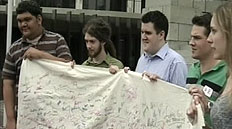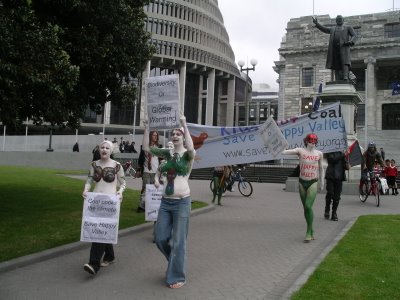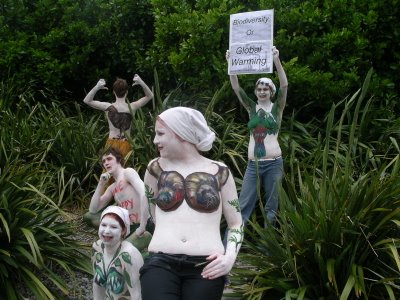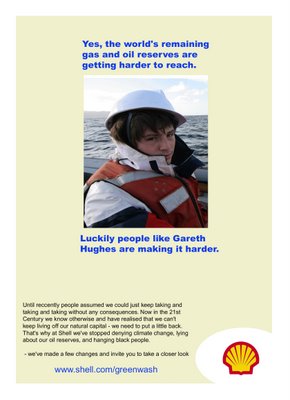Tuesday, November 28, 2006
Tuesday, November 14, 2006
Friday, November 10, 2006
Oil, Smoke and Mirrors
Labels: peak oil and climate change
Tuesday, November 07, 2006
Party Youth Wings get together to 'Keep It 18'

Media Release by: Young Labour - Young Nats - Young Greens - ACT on Campus
Youth wings from four political parties sent a united message to MPs today - Keep it 18!
In a cross party effort the Young Nats, Young Labour, the Young Greens and ACT on Campus held a joint press conference to urge MPs to vote against the Sale of Liquor (Youth Alcohol Harm Reduction: Purchase Age) Amendment Bill.
Young Labour spokesperson Sonny Thomas said;
"Parliament should look at ways of changing the binge-drinking culture that is harming our society– but raising the drinking age is not the answer. Changing attitudes towards our drinking is.
"That's why we call on MPs to get behind, and provide more support for enforcement efforts and educational campaigns like ALAC's campaign against binge drinking – not to deprive 18 year olds of the right to a beer as some sort of knee jerk response."
"Many young activists would find it difficult to campaign and vote for a political party, yet not be able to buy a drink to celebrate their party's election."
Young Nat's President Matthew Patterson said;
"This bill is just unfair. If the law allows 18 year olds to fight for their country, get married and vote - why can't we have the freedom to buy a drink? It would be ridiculous if 19 year olds are being sent overseas on often dangerous peace keeping missions with our armed forces, yet when they return can't have a drink with their colleagues.
"In addition, this is bad law - it creates multiple inconsistencies between bar staff and patrons, and there has been no proper consultation with young people
Young Greens spokesperson Zach Dorner said;
"20 was an age limit that no-one respected or enforced. It didn't work then so why go back? The 18 years limit is working well in responsible bars, but issues remain around irresponsible supply. We say to MPs tackle this problem, not the age limit."
"Political parties should look at how alcohol is promoted to young people."
ACT on Campus's Helen Simpson said;
"This Bill is immoral. It is immoral because it is an assault on freedom and democracy. It contradicts the liberal democratic notion that parliament exists to protect the socially responsible majority from the tiny handful of reckless individuals who refuse to respect others.
"We call on parliament to take responsibility and resist the temptation for a sensational headline-grabbing ban."
The group urged all MPs, who are facing a possible vote on the Bill this Wednesday, to listen to the voice of those who will be affected, ditch the proposal and instead focus on finding actual solutions to New Zealand's drinking problems.
Rasing the drinking age wont work, changing attitudes will.
Saturday, November 04, 2006
Strip Naked Not Strip Mining!


Saturday 4 November 2006
PRESS RELEASE:
Save Happy Valley Coalition members marched from Aro Valley toParliament and then Waitangi Park wetland to highlight state-ownedenterprise Solid Energy’s proposal to destroy a pristine wetlandecosystem on the West Coast of the South Island. In collaborationwith local artists, marchers were body painted to bring attention tothe myriad native and endangered species threatened by the proposedcoal mine.”
Wellington City Council put many thousands of dollars into restoringthis wetland in Wellington city that was originally destroyed byshort-sighted town developers, and wetland restoration is undertakenin many parts of the country at great expense. It is inanity that theproposal of a state-owned coal-mining company to destroy the wetlandWaimangaroa Valley (otherwise known as Happy Valley) and Mt Augustus– which are both untouched and unique ecosystems – has beensanctioned by the Conservation Minister Chris Carter” said Save HappyValley Coalition Wellington spokesperson Alex Winter-Billington.
“Climate change has been identified by economists, environmentalistsand social scientists as possibly the greatest threat to humanity andthe global environment today. Yet, despite the NZ Government’sostensible commitment to the Kyoto Protocol, it has agreed to allow anew coal mine to be opened in one of this country’s most preciousnatural environments.” Ms Winter-Billington added.”
An estimated 8% of Aotearoa New Zealand’s wetlands have survived tothe present day; over 90% of has been drained primarily for farming.What is left is critical habitat for rare and endangered species thatwill not survive without them, such as the two critically endangeredgiant carnivorous snail species that are endemic to Mt Augustus andthe Waimangaroa Valley and the Great Spotted Kiwi that have beenthriving in these largely predator-free zones. The health of suchspecies and ecosystems is furthermore critical for maintaining ahealthy level of biodiversity in Aotearoa New Zealand” she commentedfurther.
Save Happy Valley is an independent coalition fighting to protect theNgakawau Recommended Protected Area, the Waimangaroa Valley and MtAugustus. The group was formed in 2004 and has used creativenon-violent direct action to highlight the campaign; notablycoalition members have been occupying the Waimangaroa Valley for oversix months and have brought court cases against both Solid Energy andConservation Minister Chris Carter for their decisions regarding theproposed mines, both of which will be heard this year.ENDSMedia Contact:Alex Winter-Billington, Save Happy Valley Coalition WellingtonDelegate04) 385 4171, 0274 225 128More photographs available on requestFor information on the history of Save Happy Valley Coalitioncampaign history, visit the website:http://www.savehappyvalley.org.nz/aboutus.htm"
Labels: SHVC
Friday, November 03, 2006
Snowpeople at Parliament
Wednesday, November 01, 2006
Talking trash on my birthday
The school had just started a paper recycling scheme and wanted someone to come and give the students reasons why they should care.
I pointed out that it is a massive problem in New Zealand and each year on average a kiwi throws out about 310kg much of it stuff that could be recycled or in the case of green waste - valuable stuff that could be used instead of or reducing our use of petro-chemical fertilisers. Our views have changed over time and the only solution anymore isn't to just dig more holes and bury it. In 1990 we had 327 landfills now in 2006 the number has reduced to 90, however one researcher has pointed out that we have approximately 1000 illegal tips operating in NZ, many of which are on farms. Rubbish mountains create many problems:
- Chemicals or other nasty compounds can leach into the ground polluting water (in the first year of a chemical recovery programme in 2004 over 220 tonnes were collected)
- We can't just keep on digging more giant holes - no one wants to live near a landfill
- Landfills produce methane, a greenhouse gas roughly 30 times worse than CO2 (which we could also be burning for electricity production but at the moment waste)
- and lastly, it takes a lot more energy to produce new things from scratch than recycling and reusing a product.
- Shop creatively and buy products with less packaging. Roughly 80% of a products waste is generated even before the consumer receives it. I gave the example of my old zero-waste flat as an extreme measure, demonstrating that it is possible...if you like sunflower seed milk

- Recycle at home. 80 % of New Zealand has kerbside recycling - Naenae is part of that 80%
- Compost your green waste or get a worm farm
The Bill has several major features:
- Bans on landfilling certain products (eg paper can be recycled easily and cheaply and is a valuable resource - why should we just bury it?
- Levy on waste - both to act as a economic deterrent and to fund positives alternatives
- waste Minimisation authority to oversea waste reduction strategies.
- Extended Producer responsibility - in short making the producer responsible for the whole lifetime of their product, acting as an incentive to design out as much waste as possible. Already this is being seen in some industries such as:
- Tyre track recyles old tyres. In only 18 months they collected 1.3 million old tyres.
- Fischer and Payckel will recycle their old whitewear.
- Vodafone and Telecom will accept old phones for recycling
- Dell, IBM and Hewlett Packard accept old computers





